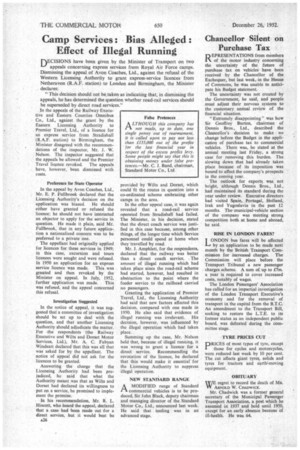Camp Services : Bias Alleged : Effect of Illegal Running
Page 28

If you've noticed an error in this article please click here to report it so we can fix it.
nECISIONS have been given by the Minister of Transport on two 1-" appeals concerning express services from Royal Air Force camps.
Dismissing the appeal of Avon Coaches, Ltd., against the refusal of the Western Licensing Authority to grant express-service licences from Netheravon (R.A.F. station) to London and Birmingham, the Minister . declares: "This decision should not be taken as indicating that, in dismissing the . appeals, he has determined the question whether road-rail services should be superseded by direct road services."
In the appeals of the Railway Executive and Eastern Counties Omnibus Co., Ltd., against the grant by the Eastern Licensing Authority to Premier Travel, Ltd., of a licence for an express service from Stradishall (R.A.F. station) to Birmingham, the Minister disagreed with the recommendations of the inspector, Mr. J. W. Nelson. The inspector suggested that the appeals be allowed and the Premier Travel licence revoked. The appeals have, however, been dismissed with costs.
Preference for State Operator In the appeal by Avon Coaches, Ltd., Mr. E. P. Fullbrook declared that the Licensing Authority's decision on the application was biased. He should either have granted or refused the licence; he should not have instructed an objector to apply for the service in question. He made it plain, said Mr. Fullbrook, that in any future application a nationalized concern was to be preferred to a private one.
The appellant had originally applied for licences for these services in 1949; in this case, excursion and tours licences were sought and were refused. In 1950 an application for an express service licence was made. This was granted and then revoked by the Minister on appeal. In July, 1952, further application was made. This was refused, and the appeal concerned this refusal.
Investigation Suggested In the notice of appeal, it was suggested that a committee of investigation should be set up to deal with the question, and that another Licensing Authority should adjudicate the matter. For the respondents (the Railway Executive and Wilts and Dorset Motor Services, Ltd.), Mr. A. C. Fabyan Windeatt declared that this was all that was asked for by the appellant. The notice of appeal did not ask for the licences to be granted.
Answering the charge that the Licensing Authority had been prejudiced, he said that what the Authority meant was that as Wilts and Dorset had declared its willingness to put on a service, he promised to implement the promise.
In his recommendation, Mr. R. Hiscott, who heard the appeal, declared that a case had been made out for a direct service, but it would best be A26 provided by Wilts and Dorset, which could fit the routes in question into a co-ordinated scheme embracing other camps in the area.
In the other appeal case, it was again revealed that a road-rail service operated from Stradishall had failed. The Minister, in his decision, stated that the direct coach service was justified in this case because, among other things, of the longer time which Service personnel could spend at home when they travelled by road.
Mr. J. Amphlett, for the respondents, declared that the railway was better than a direct coach service. The amount of illegal running which had taken place since the road-rail scheme had started, however, had resulted in abstraction to the point where the feeder service to the railhead carried no passengers.
Granting the application of Premier Travel, Ltd., the Licensing Authority had said that new factors affected this decision, compared with one made in 1950. He also said that evidence of illegal running was irrelevant. His decision, however, was influenced by the illegal operation which had taken place.
Summing up the case, Mr. Nelson held that, because of illegal running, it was wrong to grant a licence for a direct service. Recommending the revocation of the licence, he declared that this would make it essential for the Licensing Authority to suppress illegal operation.
NEW STANDARD RANGE
A MODIFIED range of Standard ri• commercial vehicles is to be produced, Sir John Black, deputy chairman and managing director of the Standard Motor Co., Ltd., announced last week. He said that tooling was in an advanced stage.












































































